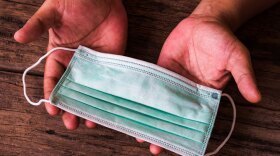In crises like the Coronavirus pandemic, Roaring Fork Valley residents turn to first responders for help. But healthcare workers and emergency response teams need support too.
As a nurse in the critical care unit at Valley View Hospital, Gail Rounce knows the anxiety of caring for COVID-19 patients firsthand.
“It’s unlike anything I've ever dealt with… it's not only challenging from a physical standpoint, of being under these layers of protective equipment, but a lot of these people are by themselves,” Rounce said. “There's a level of support that we need to be able to provide for them that is really hard to do when you're behind these physical barriers.”
While being a small community can make it easier to contain the virus, Rounce explained this also adds a unique kind of stress to her job.
“Most of these patients coming through are people that we know from the community,” Rounce said. “So it's really a personal impact as well as an impact on the job.”
They always say one of the keys to mental health is to not have these catastrophic thoughts, thinking of the worst case scenario, but in health care, we kind of have to do that.
Rounce said hospital workers are also afraid of bringing the virus home to their families.
“They always say one of the keys to mental health is to not have these catastrophic thoughts, thinking of the worst case scenario, but in health care, we kind of have to do that,” Rounce explained. “We have to hope for the best, but plan for the worst, especially when we're seeing such worst case scenarios from around the world.”
Living in this mindset can be exhausting, and Rounce said that’s why it’s important for first responders to have access to mental health care.
“People need that ability to have an outside person that they can vent to, that’s not going to affect their work flow or their home life,” Rounce said.
Janeil Sowards is the director of the Youth Recovery Center at Valley View Hospital. Usually, the space is a treatment center for young people dealing with addiction. The center is temporarily closed due to COVID-19. Sowards said they’ve made the space into a wellness center where anyone working at the hospital can get support.
“We have therapists who are trained, and I'm also trained, in disaster mental health, psychological first aid and mental health first aid,” Sowards said. “And so we've had some experience with offering support to individuals during times of stress and disaster.”
Sowards said that she and her team are working to normalize mental health support and to make sure that everyone at Valley View feels welcome at the wellness center.
“There's kind of a stigma about mental health and asking for help and everyone feels this, even therapists, counselors, social workers,” Sowards said. “We all have this kind of fear about reaching out because that might mean that we aren't capable or that we're not holding it together because our role is to help others.”

Aspen Fire Chief, Rick Balentine, is all too familiar with this stigma. Balentine said he had to work through this with his team when they started doing in-house yoga and wellbeing classes with local mindfulness organization Lead With Love last year.
“You don't really see firefighters a lot of times doing yoga, although it's probably more prevalent than you might imagine,” Balentine said.
The weekly class is offered on Zoom during the stay-at home order and they’ve opened it up to firefighters’ families.
“A lot of times first responders are going out to help other people, but their spouses are left behind, really worried about them,” Balentine said. “We didn't have an avenue to help their spouses and other people at home to get stress relief, so we found this helped a lot.”
Balentine said they’ve also invited their fellow fire departments, ambulance districts and other first responder partners in the valley to join in.
“For me personally, I've never been much of a Yogi,” Balentine said. “But since I started doing this, I'm finding that it really does help relieve the stress of the day if you've got a bad call or whatever it is.”
It’s not just yoga and wellbeing tools that are important in times like this. Balentine said the zoom sessions also restore a sense of community to Aspen’s volunteer fire department.
“You know, a big part of the reason people volunteer in any organization is the comradery and the social interaction with their other teammates, but we've had to curtail that almost entirely unless we're going to call,” Balentine said. “So it gives us an opportunity to see each other.”
For Balentine and other first responders in the valley, mental health care is not an abstract concept, it’s a matter of life and death. Balentine said police officers and firefighters are more likely to die by suicide than in the line of duty.
“It's probably more important than we can even stress, PTSD and firefighter suicides, first responder suicides,” Balentine said. “Keeping on top of your mental health and your partner's mental and your fellow responders’ mental health is very important.”
Therapist Janeil Sowards agrees that mental health care is important for first responders, and for everyone else right now, too.
“Know that we're all in this together” Sowards said. “The worst thing we can do is to isolate and feel lonely and feel like you're in this all by yourself.”
The best thing you can do, Sowards said, is reach out and talk to someone.







